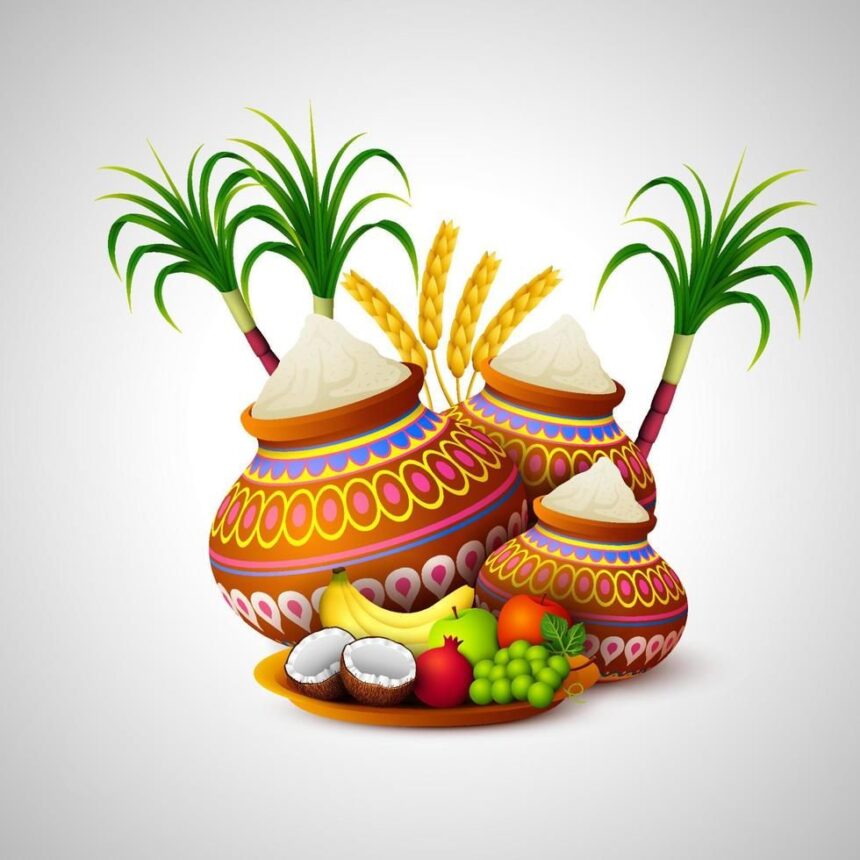Pongal: Overview
Pongal is a major harvest festival celebrated predominantly in Tamil Nadu and parts of South India. It is dedicated to Surya, the Sun God, and marks the end of the winter solstice and the beginning of the harvest season.
The festival is celebrated over four days in mid-January, coinciding with the Tamil month of Thai, usually from 14th to 17th January. Pongal is both a religious and cultural festival, reflecting gratitude towards nature, prosperity, and agricultural abundance.
History of Pongal
Agricultural Significance:
Pongal has its origins in agrarian traditions, celebrating the harvest of rice, sugarcane, and other crops.
Farmers thank the Sun God, cows, and nature for providing fertility, prosperity, and sustenance.
Mythological Significance:
Legends describe Surya, the Sun God, being worshiped for a bountiful harvest.
Pongal is believed to have been celebrated for centuries by Tamil communities as a way to honor nature and divinity.
Cultural Significance:
The festival fosters community bonding, family gatherings, and preservation of Tamil traditions.
Significance of Pongal
Religious Significance:
Worships Surya (Sun God), nature, and cattle, acknowledging their role in agricultural success.
Symbolizes gratitude, prosperity, and divine blessings.
Agricultural Significance:
Marks the harvest of crops, ensuring the sustenance of communities and farmers.
Celebrates hard work, abundance, and harmony with nature.
Social and Cultural Significance:
Strengthens family ties, community unity, and cultural identity.
Preserves traditional rituals, cuisine, and folk arts.
Rituals and Celebrations
Pongal is celebrated over four main days, each with distinct rituals and significance:
1. Bhogi Pongal
The first day celebrates Lord Indra and the removal of old belongings, symbolizing renewal and fresh beginnings.
Houses are cleaned, and old items are discarded and burnt in a bonfire.
2. Surya Pongal (Thai Pongal)
The second day is the main day of Pongal, dedicated to Sun God worship.
Newly harvested rice is boiled with milk and jaggery in an earthen pot, overflowing as a sign of prosperity.
Families pray for health, wealth, and agricultural abundance.
3. Mattu Pongal
The third day honors cattle (Mattu), recognizing their role in agriculture.
Cows and bulls are decorated with bells, garlands, and painted horns.
Special rituals and offerings are made to thank them for their labor.
4. Kaanum Pongal
The fourth day focuses on social gatherings and family reunions.
People visit relatives, organize feasts, and participate in community events.
It is also a day for prayers for friends and relatives’ well-being.
Festive Foods
The festival is famous for Pongal dish, made from rice, jaggery, milk, and ghee.
Other traditional foods include sundal, vadai, and sweets, shared with family and community members.
Pongal Across South India
Tamil Nadu: Celebrated with grand rituals, community feasts, and cultural programs.
Andhra Pradesh & Telangana: Known as Sankranti, featuring kite flying and social gatherings.
Karnataka: Celebrated as Sankranti, with cattle worship, fairs, and folk performances.
Kerala: Similar harvest celebrations include Makara Pongal rituals in temples and households.
Impact on Daily Life and Society
Cultural Preservation: Encourages traditional rituals, music, and folk arts.
Community Bonding: Strengthens social ties, family unity, and neighborly relationships.
Agricultural Awareness: Highlights the importance of farming and respect for nature.
Economic Boost: Promotes markets for agricultural produce, festive items, and sweets.
Spiritual Growth: Inspires gratitude, devotion, and harmonious living.
FAQs about Pongal
When is Pongal celebrated?
Mid-January, over four days in the Tamil month of Thai.
Why is Pongal dedicated to the Sun God?
The Sun God is vital for crop growth, and Pongal expresses gratitude for bountiful harvests.
What is the significance of Mattu Pongal?
Cattle are honored for their contribution to farming, decorated and worshiped on this day.
What foods are prepared during Pongal?
Pongal (rice dish), vadai, sundal, and other traditional sweets.
Is Pongal celebrated outside Tamil Nadu?
Yes, similar harvest festivals like Sankranti are celebrated in Andhra Pradesh, Telangana, Karnataka, and Kerala.
Conclusion
Pongal is more than a harvest festival—it is a celebration of nature, prosperity, and community spirit. Through rituals, feasts, and social gatherings, it emphasizes gratitude, cultural heritage, and harmonious living. Pongal strengthens family bonds, preserves traditions, and fosters unity, making it one of South India’s most cherished and vibrant festivals.








